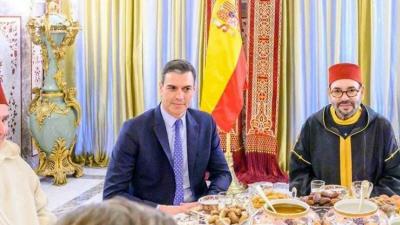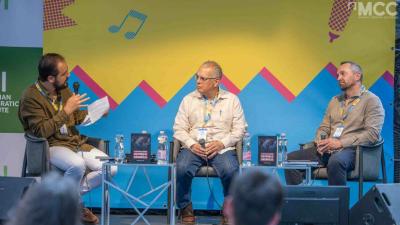In 1801, the Turkish pasha of Tripoli (Libya), then a territory belonging to the Ottoman Empire, demanded that the Americans increase the $83,000 blackmail they had been paying annually for the past five years in exchange for the pirates not attacking his trade. This initiated the first Barbary War (Barbary being the name by which Europeans, until the 19th century, referred to the coastal regions of Morocco, Algeria, Tunisia and Libya). The war lasted four years and ended with a peace treaty and the payment of $60,000 to the pirates in ransom for the crew of USS Philadelphia, which had been captured in 1803. A few years later, in 1812, with the United States at war with Britain, the pirates were at it again, attacking merchant ships and demanding ransoms for the crews. The Americans once more decided to satisfy the pirates, but again, it was not enough, and the Algerians declared war on the United States. In 1815, with the war with the British over and the policy of concessions having failed, the US Navy attacked the pirates in Algiers and Tunis, putting an end to pirate attacks and the payment of tribute. The following year, Algerian pirates again rejected the treaty and continued their raids until an Anglo-Dutch fleet bombarded Algiers and forced them to surrender and abolish their 'custom of taking Christian slaves'.
Unlike the Americans, Spain always knew that giving in to blackmail would ultimately only bring one humiliation after another and ever greater daring on the part of the pirates. Spain's Mediterranean coasts suffered violent and continuous attacks by Barbary pirates, and watchtowers were set up to warn of their arrival. It is those times that gave rise to the popular expression "no moros en la costa" (“the coast is clear”: today, this sentence is used to signal that there is no danger in sight - though some leftists and people ignorant of their own history call it a "racist" expression). Spain did not just stay on the defensive, but attacked the pirate strongholds and confronted the Turkish power that sustained piracy with such famous victories as Lepanto. During the last fifty years, however, Spain has forgotten much of its history. Since the Green March of 1975, when Morocco took advantage of Spanish weakness to seize the Sahara territory, the relationship with our southern neighbour has been, with few exceptions, a succession of blackmails and humiliations. Spain has showered Morocco with money to control illegal immigration. Morocco supported it in its own interests, using immigrants as a weapon and allowing assaults on Spanish borders when it wanted more money or a political stance from Spain. It was as if Poland, at the time of the migration crisis on its eastern border, gave money to Lukashenko so that Belarus would prevent assaults on the Polish border from its territory. Predictably, the assaults would never stop and Poland would be the victim of permanent blackmail. Unfortunately, unlike Poland, Spain has rulers who are more concerned with their personal benefits than with the integrity and honour of their country.
Blackmail also entails humiliation - and there are many examples for this: the claim to the border cities of Ceuta (Portuguese since 1415 and Spanish since 1580) and Melilla (Spanish since 1497; while Morocco did not become independent from France until 1956), and even the Canary Islands; the May 2021 avalanche when, following a Spanish government decision that annoyed Morocco, eight thousand Moroccans stormed and crossed the Ceuta border, including more than 1,500 minors who believed that the football player Cristiano Ronaldo was going to play in the city, causing chaos in Ceuta and a huge effort by the Spanish government to subsequently return the minors to their families in Morocco; the insult to the Spanish flag, placed upside down at the Spanish-Moroccan meeting in April 2022, which no one in the government delegation was able to appreciate; or the usual insults and contempt of the Moroccan press towards Spain. All this, while Spain continues to send money to Morocco, such as the 20 million euros for Moroccan development in October 2022 or the 800 million in credits for companies that want to invest in Morocco, approved during the bilateral summit in February this year. A summit that, according to the government and its like-minded media, seals the friendship with our neighbour. The question is: until when?
Many believe that Spain's problem vis-à-vis Morocco has its origins in a 'do-gooder' attitude - a disease from which the West also suffers. It is undoubtedly true that do-gooderism affects a large part of the society that is incapable of distinguishing between blackmail or the use of immigration as a political weapon of destabilisation. Yet that cannot explain what is happening between Spain and Morocco. In the Pegasus spying scandal, revealed in May 2022, the Spanish government acknowledged that the phones of the prime minister, Pedro Sánchez, and the then foreign minister, Arancha González Laya, had been tapped just a year earlier - in the midst of the crisis of the assault on Ceuta. This could be a further step in blackmail and would explain the Spanish government's historic change of attitude towards the Sahara issue: accepting Morocco's 2007 plan without getting anything in return. The above has triggered a conflict with Algeria, our main gas supplier - and the country from where boats with illegal immigrants are already beginning to arrive.
Neither can nor should we rule out bribery and the buying of wills, possibly with the very money received from Spain - especially when we see that this modus operandi has been taking place in the heart of the European Union. In the opinion of the Polish MEP Dominik Tarczynski, the recent case of bribes for European politicians, known as Qatargate, with suitcases of the European vice-president, the Socialist Eva Kaili, full of euros, is turning into Moroccogate and would explain Brussels’ strategic decision in to support Morocco. For the moment, several Greek, Belgian and Italian Socialist MEPs are implicated, as well as Abderrramin Atmoun, Morocco's current ambassador to Poland, who chaired the EU-Morocco Joint Committee with another implicated party, Italian Socialist MEP Panzeri.
On 19 January, the European Parliament passed a resolution criticising Morocco for its attacks on journalists. The Spanish Socialists, usually so concerned about human rights, voted against and the Spanish Popular Party abstained. Once again, an incomprehensible attitude on the part of the members of the parties that have governed Spain for the past decades, which can only be explained by the fact that the threads of this corruption scheme ended up in Spain - Spain that needs more than ever a firm foreign policy to defend its borders, free of blackmail and of politicians sold out to foreign countries.
Photo: MAP Agency
Read also
Interview with Andrzej Podgurski – spokesman for the Polish Legion
Andrzej Podgurski is a Polish journalist and volunteer. A war correspondent since the beginning of the full-scale Russian invasion, he is the spokesman for the Polish Legion, an umbrella organization of humanitarian and military volunteers in Ukraine.
Álvaro Peñas
Alejandro Peña Esclusa: “We must create a mass movement capable of defeating cultural Marxism”
In my previous article, “That wonderful feeling of normality”, I commented on the enormous variety of debates organised by the Mathias Corvinus Collegium.
Álvaro Peñas
“Russia is exploiting divisions in Moldova”: An Interview with Dionis Cenusa
Dionis Cenusa is an associate expert at EESC (Eastern European Studies Centre) and a researcher and Ph.D. student at the Institute of Political Science at Justus Lybig University in Giessen, Germany.














Comments (0)